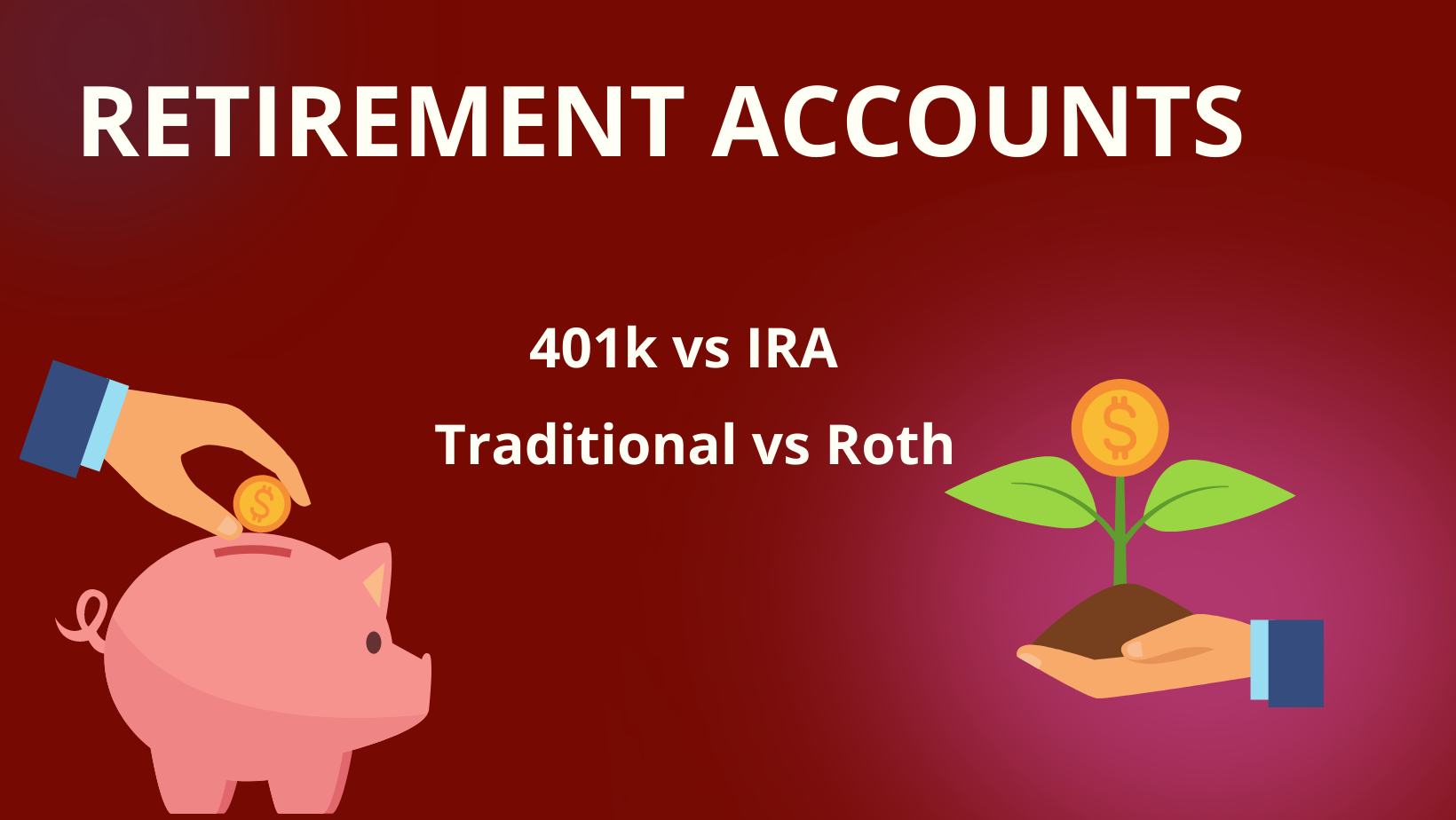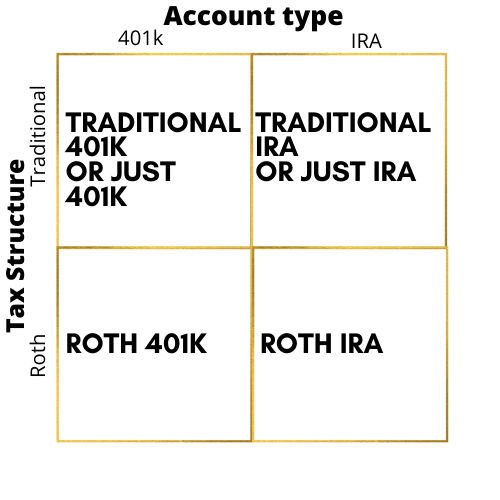
Retirement Accounts – 401k’s, IRA’s
There are many types of tax advantaged accounts available in the US. Retirement accounts include 401k’s, IRA’s, and less common options such as SEP, SIMPLE, 403b.
All of these are accounts, not investments; that means they’re places to hold your money just like a standard brokerage account. I often hear people talk about ‘I have X invested in my 401k’ but don’t know what it’s invested in – is it S&P500 ETFs, Microsoft stock, bonds? For the most part, there aren’t any more restrictions to your retirement accounts than there are to any normal brokerage account with Robinhood or Fidelity.
Retirement Accounts: The most commonly used tax advantaged accounts are retirement accounts. You get to skip paying taxes on either your contributions or gains, sounds like a great deal, except you can’t freely withdraw the money until you’re 65 years old. I’ll explain the rules to withdraw money later when we talk about Roth vs Traditional.

A 401k is an account set up through your employer. Contributions are usually deducted from your paycheck before you get it, and any decent job will match some of your contribution – that’s free money from them. When you leave your job and go to a new one, all of the money in your 401k is still yours but you may want to roll it over to a personal account at the brokerage of your choice (maybe you prefer CharlesSchwab but your job made you use Vanguard for their 401k).
An IRA is an Independent Retirement Account. That means you set this up anywhere and only you decide when/how to contribute to it. You can rollover an employer 401k plan into your IRA when you leave that job.
Roth vs Traditional: your 410k and IRA accounts get even more complicated! They can be either Roth or Traditional! Some employers only offer traditional, but it’s more common for them to offer both now; and as you remember, IRA’s are completely in your control so you can have one or the other – or have a separate account for each type. Roth and Traditional refer to the style of tax advantage for the account.
Roth means you’re paying taxes up front. So I get my paycheck, taxes have already been deducted, and then I deposit $500 into my roth IRA. Taxes are already paid(my company paid them for me before I got my direct deposit), so if I invest my $500 into Google, and after some years my shares appreciate in value and are now worth $800, then my $300 profits don’t get taxed by the government and I get to keep it all, sweet. If I was using a regular brokerage, then I’d have to report that $300 gain as income and pay taxes on it. In my opinion, money ‘feels’ more liquid in a Roth because you can withdraw some of it without penalties. You can withdraw your contributions no problem, but you have to pay high early withdrawal fees if you want to take out your gains. It’s a bad idea to cash out gains, or even contributions, unless absolutely needed. The reason you can withdraw your contributions no problem is because you already paid taxes on it – the money is totally yours.
If you don’t want to pay taxes up front, you can set up a Traditional account. This means you add money before taxes are taken out, or you get a refund come tax season for what you contributed. If I get taxed 20% of my income in general, and I made $1000, I’d have to first pay $200 to the government and then I can invest my remaining 800 in a retirement account. But if it’s a Traditional account, I can just deposit the whole $1000 without paying taxes on it. Then if I make 10% gains, I’ve gained $100 (1000x.1) instead of only $80 (800x.1). Compounding gains are important! You do have to pay taxes eventually, so when you withdraw this money at 65 years old you pay taxes at that time unlike Roth. This may be beneficial since you probably won’t be working or making much money when you’re old, and your tax rate will be lower because of it.
You might be thinking that one of these is much better than the other, but if you crunch the numbers there isn’t a difference. Paying taxes up front and getting tax-free gains, or benefiting more from compound interest and paying taxes later, both even out in the end. Any benefit depends on your tax rate now, and your estimated tax rate at the time you’ll be taking money out. If you’re a high earner and get taxed 32%, it’s probably smarter to go Traditional and withdraw/get taxed when you’re old and have a low income so your tax rate is only 15%. If you think the US will jack up taxes on everyone in the future, maybe pay taxes now and use a Roth account. Either way, you can only deposit $6500 per year total into any amount of IRAs, and $19,500 total into your 401k total between Traditional and Roth (yes you can have both for a 401k as well)
If you’re self-employed, you have way more options that I’m not gonna get into here. I’ve spent a lot of time self-employed, so reach out to me directly if you want me to make an article for that too!

